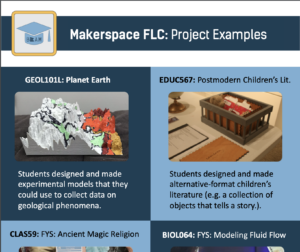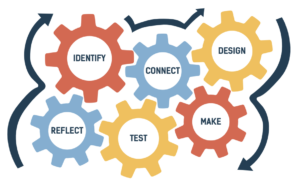Home
Welcome to the application page for the Makerspace FLC Call for Proposals!
Are you looking to set up a consultation about your application?
Click here: https://makerspacecfp.web.unc.edu/consultation/
Are you ready to apply to be part of the 2021-2022 Makerspace FLC?
Click here: https://makerspacecfp.web.unc.edu/application/
If you have questions, please contact Anna Engelke, BeAM Education Program Manager, at anna@beam.unc.edu.
Application Information
Click on the tabs below to read more information about the Makerspace Faculty Learning Community, expectations of FLC participants, and how to apply to be part of the 2021/2022 cohort.
January 15th through February 28th, 2021: (Optional) Application consultations available by appointment
March 1st, 2021: Applications due
March 2nd – March 31st: Review committee meets to discuss all applications
April 1st, 2021: Applicants notified of final decisions
May 2021: Recipients participate in 2021/2022 Makerspace FLC Orientation
Summer 2021: Makerspace Course Design Institute (6 hours)
Fall 2021: 3 monthly meetings of 2021/2022 Makerspace FLC Cohort
Spring 2022: 3 monthly meetings of 2021/2022 Makerspace FLC Cohort
The Makerspace program focuses on one aim of the QEP: translating novel ideas generated through discovery into tangible form. While making has impacted research and extracurricular activities on campus, the QEP makerspace program specifically focuses on the undergraduate curriculum across all disciplines, forging natural connections between the arts and humanities and the sciences. A broad goal of all QEP programs is for students to learn about failure, iteration, and resilience. Makerspace courses have a unique opportunity to give students the time to experience and grow in these ways.
Students who complete a Makerspace course will be able to:
- Apply design-thinking and iterative processes to develop ideas related to course concepts.
- Articulate specific ways experiential learning through Making has enhanced understanding of course concepts.
- Produce work that shows evidence of innovation, risk-taking, collaboration, a design process, fabrication, documentation, and communication of process.
- Effectively critique others’ work and use critiques of their own work for improvement.
BeAM@CAROLINA is a network of makerspaces where any UNC student, staff, or faculty member can join the UNC maker community in the design and creation of physical objects for education, research, entrepreneurship, and recreation. The makerspaces are equipped with a wide variety of tools, including 3D printers, laser cutters, vinyl cutters, sewing machines, electronics, a metal shop, and two woodshop areas. A full list of the BeAM resources and facilities may be found at: https://beam.unc.edu/locations/. We strongly encourage you to schedule a visit.
 Making brings hands-on collaborative learning to students and can take many forms. Click on the image to the left to see a few examples of previously accepted projects to spark your creativity. Students in these courses also presented their work professionally on campus at an exposition that occurs each semester. These courses and others can be found at: https://qep.unc.edu/courses/.
Making brings hands-on collaborative learning to students and can take many forms. Click on the image to the left to see a few examples of previously accepted projects to spark your creativity. Students in these courses also presented their work professionally on campus at an exposition that occurs each semester. These courses and others can be found at: https://qep.unc.edu/courses/.
Strong proposals incorporate project-based learning (PBL). These are projects that extend over a semester, include student input and reflection, teach effective critique, and include public-facing components. An article from TeachThought nicely summarizes the difference between projects and PBL: “Projects can represent a range of tasks that can be done at home or in the classroom…quickly or over time. While project-based learning (PBL) also features projects, in PBL, the focus is more on the process of learning and learner-peer-content interaction than the end-product itself.”
Instructor Eligibility:
Full-time faculty members in all academic units are eligible to apply. They must also be listed as the instructor of record for the course. Applicants need not have prior experience with the makerspace tools. Instructors must be willing to learn and apply new technologies and pedagogies. Applicants must also take responsibility for the development and execution of their projects. Instructors may apply in pairs for shared projects.
Course Eligibility:
Existing courses taught at least once during the 2020-2021 academic year, including summer session courses, are eligible. Small or large classes in any discipline are eligible, as are courses falling under categories such as First Year Seminars or Honors courses.
The proposed integration should not rely on regularly scheduled class meetings in the BeAM facilities due to limitedphysical space and time constraints in the BeAM Makerspaces. The project should use both individual and group work throughout the design process to encourage ideation, prototyping, feedback, and iteration. For more on the typical design process used in makerspace course projects, click on the thumbnail to the right.
Additional support from BeAM staff will be provided to Makerspace FLC members, including course design workshops, project prototyping sessions for faculty, reserving 2-3 private sessions in the makerspaces for classes, and providing resources for digital design support.
All FLC participants are expected to submit a complete course that incorporates design and making at the conclusion of the FLC. This will be posted on a shared Sakai site, and will include course objectives for making, a syllabus, learning exercises, an early semester making experience, a full semester making project, and rubrics that assess the processes and outcomes involved in design and making for the course.
After the 2021/2022 academic year, accepted applicants are expected to remain a part of the Makerspace FLC community by serving as peer mentors for the 2022/2023 Makerspace FLC cohort through application consultations and classroom observations. Attendance at future FLC meetings is optional but welcomed.
Grant recipients are required to take part in regularly scheduled Faculty Learning Community (FLC) meetings. These meetings will allow faculty to share ideas, problems and solutions around their integration of making projects into courses. The FLCs will meet eight to ten times in a calendar year.
Recipients are also required to participate in faculty surveys, interviews, and peer visits. They will prototype a small version of their course project with help from the BeAM Education Program Manager during the summer before the 2021/2022 academic year begins. They will facilitate documentation of student projects and minimal student surveys regarding the project’s efficacy. They also must present (alongside their students) in at least one session of the QEP Making and Research Expo, which occurs once a semester during the 2019/2020 academic year.

